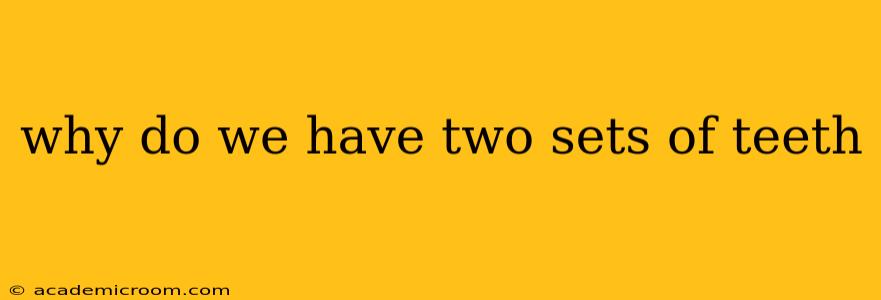Humans, like many other mammals, develop two sets of teeth during their lifetime: deciduous teeth (also known as baby teeth, primary teeth, or milk teeth) and permanent teeth. This process, known as diphyodonty, isn't random; it's a crucial evolutionary adaptation serving several important functions. Understanding why we have two sets of teeth requires examining their roles in development and overall oral health.
What are Deciduous Teeth?
Deciduous teeth are the first set of teeth to erupt in children, typically starting around six months of age and continuing until around age three. These 20 teeth are smaller and whiter than permanent teeth and play a vital role in:
- Early Nutrition: They help children chew and digest food, crucial for proper growth and development. A child's ability to effectively masticate (chew) solid foods influences their dietary intake and overall nutritional well-being.
- Speech Development: The presence of baby teeth contributes to proper articulation and the development of clear speech patterns. The placement and shape of these teeth influence how sounds are formed in the mouth.
- Jaw Development: Baby teeth act as placeholders for permanent teeth, guiding their eruption and helping the jaws grow to the correct size and shape. The roots of the deciduous teeth help stimulate the growth of the jawbone, ensuring adequate space for the larger adult teeth.
What are Permanent Teeth?
Permanent teeth erupt from around age six and continue into adolescence, eventually totaling 32 teeth (including wisdom teeth). These teeth are larger and stronger than deciduous teeth, designed to handle the demands of a more mature diet and longer lifespan. They are crucial for:
- Efficient Digestion: The larger and stronger permanent teeth are better equipped for efficiently breaking down food, maximizing nutrient absorption. This is particularly important as dietary needs and consumption habits change throughout life.
- Long-Term Oral Health: Permanent teeth are intended to last a lifetime with proper oral hygiene and regular dental care. Their loss can have significant consequences for chewing, speech, and overall health.
- Facial Aesthetics: The arrangement and health of permanent teeth significantly influence facial structure and appearance. A well-aligned, healthy smile boosts confidence and contributes to overall well-being.
Why Do We Need Two Sets?
The existence of two sets of teeth represents a sophisticated biological strategy that offers numerous benefits:
- Jaw Growth and Development: As mentioned earlier, deciduous teeth act as guides for permanent teeth, ensuring sufficient space for their eruption and proper jaw development. Without baby teeth, the jaws might not grow to the appropriate size to accommodate the larger permanent teeth.
- Adaptation to Dietary Changes: A child's diet differs significantly from an adult's diet. Baby teeth are suited for softer foods consumed during early childhood, while permanent teeth are built for handling a broader range of food textures and increased chewing demands.
- Reduced Risk of Dental Trauma: Because deciduous teeth are eventually replaced, losing a baby tooth isn't as devastating as losing a permanent tooth. This minimizes the impact of dental injuries during childhood's more active years.
What Happens to Deciduous Teeth?
The process of losing deciduous teeth is natural and involves the resorption of the roots of the baby teeth. As the permanent teeth develop, they push against the roots of the baby teeth, causing them to dissolve and loosen. Eventually, the baby teeth fall out, making way for their permanent counterparts.
What if Deciduous Teeth are Lost Prematurely?
Premature loss of deciduous teeth can lead to problems with jaw development and misalignment of permanent teeth, potentially requiring orthodontic intervention later in life. Maintaining good oral hygiene and protecting deciduous teeth is crucial for proper dental development.
Are There Any Variations in the Timing of Tooth Eruption?
Yes, there can be some variations in the timing of tooth eruption, and these variations can be influenced by several factors including genetics, nutrition, and overall health. Consulting a dentist or pediatric dentist if you have concerns about the timing or pattern of your child's tooth eruption is important.
In conclusion, the presence of two sets of teeth is a testament to the sophistication of human biological development. This system is designed to meet the changing needs of a growing individual, ensuring proper nutrition, jaw development, and a healthy, functional set of permanent teeth for a lifetime.
